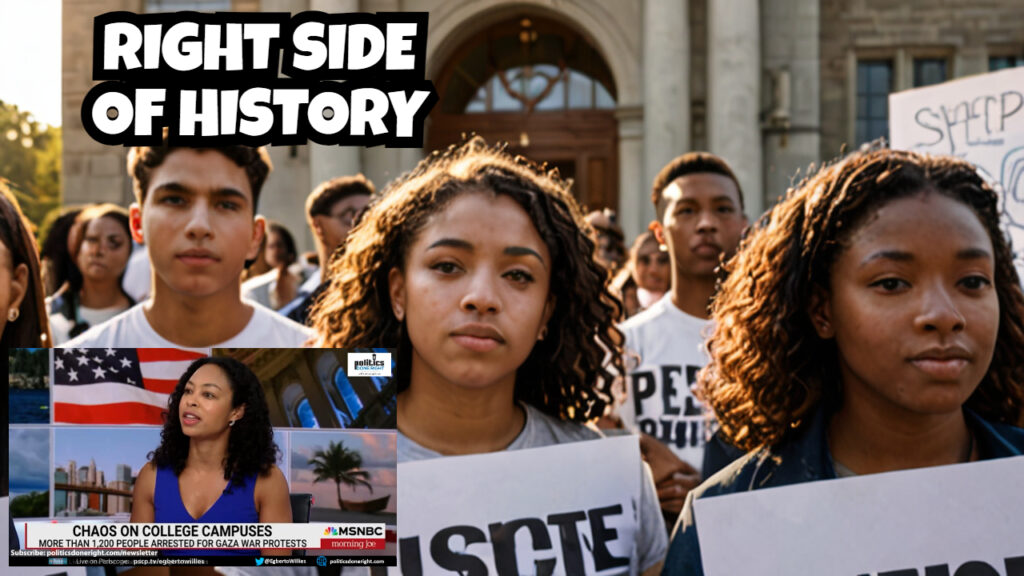Clearly, #MorningJoe had not intended to defend the student protesters. Unfortunately, Mara Gay (@MaraGay) and Anand Giridharadas (@AnandWrites) didn’t get the memo. They provided a clinic on protests.
Journalists defend student protesters on the merits.
Podcasts (Video — Audio)
The discourse surrounding student protests has often been tinged with skepticism and negativity in mainstream media, but a recent segment on “Morning Joe” showcased a refreshing shift. The show featured commentators Anand Giridharadas, Frank Bruni, and Mara Gay engaging in one of the most intelligent discussions on the current protest movement, which advocates for a ceasefire and broader peace initiatives. This conversation has not only educated the public but has also served to counter the usual narrative that seeks to undermine the legitimacy of student activism.
During the broadcast, Giridharadas and Gay skillfully reminded viewers, including co-host Mika Brzezinski, of the crucial role that student movements have historically played in societal change. The commentators highlighted student-led activism’s cyclical and often righteous nature by drawing parallels between the current protests and past movements. The current protests do not differ from the anti-apartheid divestment protests I participated in at the University of Texas in the 1980s.
The discourse emphasized that student protests, while sometimes imprecise in their policy prescriptions, often articulate underlying societal truths that those in power or mainstream media might ignore or misrepresent. Giridharadas pointed out that such movements will likely “age much better” than the conservative narratives that seek to delegitimize them. This perspective is vital in acknowledging that students may not always have the most polished or realistic solutions, but their voices reveal significant insights into societal discomforts and injustices.
Moreover, the conversation on “Morning Joe” addressed the complexity of maintaining a balanced perspective in today’s polarized environment. The commentators argued that society has struggled to hold multiple truths simultaneously, which is essential in understanding the full spectrum of political and social dynamics. The tendency to retreat to ideological battlements without considering opposing viewpoints does a disservice to public discourse and hampers the progress toward more inclusive solutions.
This nuanced discussion also tackled the visual and tactical comparisons between the student protests and the violent events on January 6, 2021. While superficially similar, these actions’ motivations and moral underpinnings stand in stark contrast. The student protesters, driven by a desire for peace and justice, starkly differ from those who sought to overturn a democratic election through violence. This distinction is crucial in understanding the ethical landscape in which these protests occur.
The conversation also illuminated the often-overlooked aspect of non-violence in protests. Despite occasional lapses, the majority of the student-led demonstrations have been peaceful and driven by a profound sense of moral urgency against perceived injustices, such as those articulated against policies in Israel’s West Bank and Gaza. This reflects a broader historical pattern where movements that initially face criticism and suppression often emerge as morally justified in the retrospective judgment of history.
The “Morning Joe” segment represents a significant moment in media coverage of protest movements. It challenges other media outlets to rise above sensationalism and superficial reporting to engage with the substantive issues at the heart of student activism. By providing a platform for deep, thoughtful discussion, the clip from the “Morning Joe” segment educates its audience and fosters a media environment where complex, sometimes uncomfortable conversations can occur.
This approach is imperative for the health of democratic discourse. It encourages a media landscape that seeks to understand and report on the motivations and truths underlying various forms of activism rather than merely casting them in a negative light. As society grapples with justice, equality, and peace issues, the media’s role in shaping the narrative becomes increasingly critical. Engaging thoughtfully with the voices of the younger generation, as done in this “Morning Joe” clip, is not just good journalism—it is an essential service to the public, ensuring that all sides of the story are explored and understood in the quest for a more just and equitable world.
Viewers are encouraged to subscribe and join the conversation for more insightful commentary and to support progressive messages. Together, we can populate the internet with progressive messages that represent the true aspirations of most Americans.

